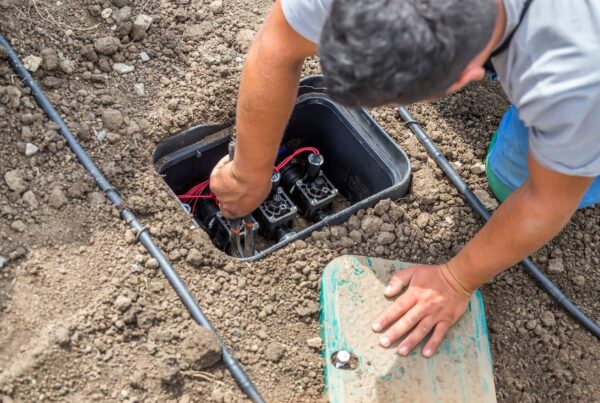
A porcelain sink is a feature in many homes, popular for its high-gloss finish and durability. It adds a touch of sophistication to any bathroom or kitchen it graces. Just like with anything in a home, it does need cleaning. The cleaning regimen for a porcelain sink should be tailored to its use. Sinks that see daily activity require more frequent attention to prevent the accumulation of stains and debris, while those used less can be tended to every week. By the end of this post, you’ll know what sets a porcelain sink apart from others, how to clean one properly, and when to involve an expert.
What Do I Need to Clean a Porcelain Sink?
Luckily, porcelain isn’t a particularly tricky material to keep clean. Your essentials for cleaning a porcelain sink might include:
- A non-abrasive cleaner or dish soap
- Baking soda
- Vinegar for optional deep cleaning
- Hydrogen peroxide for stubborn stains
- Sponge or soft cloth
- Rubber gloves– to protect your hands during the process.

How to Clean a Porcelain Sink
Cleaning a porcelain sink is pretty simple! First, run some warm water to wet the sink before applying a gentle cleaner or dish soap.
Then, using a soft cloth or sponge, scrub the sink in circular motions, taking care not to apply too much pressure. Afterward, rinse the sink thoroughly and dry it to avoid water spots.
For persistent stains, a paste made from baking soda and water can be applied, left to sit for a few minutes, and then rinsed away.
The DIY Cleaners
A homemade cleaner is the preferred method for some, and it’s as simple as it is effective. Just mix equal parts baking soda and vinegar into a paste. Spread the mixture across the sink’s surface, allow it to set briefly, and then scrub gently before washing it off.
How is a Porcelain Sink Different From Other Sinks?
Porcelain sinks stand out due to their enamel coating, which overlays a base typically constructed from cast iron or steel. In addition, this layering creates a robust, stain-resistant surface that sets it apart from other materials like stainless steel or composite sinks, which may be more prone to scratches and staining.
Keep Your Porcelain Sink Clean Longer
To extend the cleanliness of your porcelain sink, it’s advisable to wipe it down after each use, thus preventing the formation of water spots and buildup of soap scum. Additionally, refrain from leaving metal objects in the sink as they can lead to rust stains.

Maintenance for Porcelain Sinks
Maintaining a porcelain sink involves using mild detergents for regular cleaning and avoiding harsh abrasives that could damage the finish. In addition, employing a sink protector can also help shield the surface from potential scratches.
Regular maintenance is crucial in preserving the integrity and appearance of any fixture or appliance, and porcelain sinks are no exception.
Firstly, routine cleaning prevents the buildup of grime, soap scum, and hard water stains that can become more difficult to remove over time. By addressing these issues promptly, you avoid the need for harsh chemicals or abrasive cleaning methods. These could potentially damage the sink’s glossy finish. Moreover, regular maintenance safeguards against the growth of bacteria and mold, which can pose health risks. A clean sink is not only visually pleasing but also contributes to a healthier living environment.
Additionally, maintaining your porcelain sink can help identify minor issues before they escalate into costly repairs. For example, catching a small chip or crack early on might mean a simple DIY fix rather than requiring professional restoration services later.
Additional Sink Maintenance
Now that you know about taking care of the porcelain sink, there are other areas of recommended maintenance. One of those is a gurgling sink. You can fix this on your own by using a drain cleaner, drain snake, plunger or replace the P trap. You can also flush out the main system. If you aren’t sure how to do this, you may need to contact a professional.
Another is pouring bleach down the drain. It is safe to do this if the bleach is diluted. It will help clean the drain and get rid of bad smells and bacteria. If you pour bleach down the drain that is not diluted, then you must flush the drain with 10 cups of warm water to clean it out.
Lastly, you might have a kitchen sink that smells. This could be due to a clog or even bad-smelling food that went down the drain. It could also be due to a clogged sewer vent, bacteria, or sulfates. If you try to fix these issues and not having any luck, reach out to a professional for help as it could be something above what you are comfortable doing.
When to Call a Professional
Professional assistance should be sought when dealing with chips, cracks, or the need for extensive restoration of your porcelain sink. Also, if you are having a hard time using your sink or have other issues, you may need to contact a professional.
Conclusion
Porcelain sinks are just one kind of sink that you can have in your home. Additionally, proper care and routine maintenance are key to preserving the lustrous appearance of your porcelain sink. With the right approach, it will continue to serve as a functional and beautiful fixture in your home for many years. With anything, maintenance is important so keeping up with that is key. This is a great time to call the Bentley Home Inspection team for a home inspection in East Tennessee and surrounding areas.



